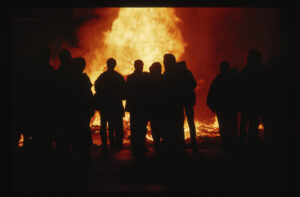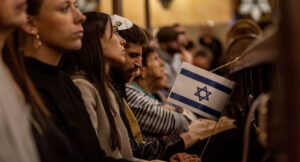“Great wars in history eventually became great wars about history,” wrote the Israeli-American historian Michael Oren in 1999. It’s hard to think of a country for which this is more obviously true than Israel, though Ireland, Ukraine or even today’s United States might have something to say about that. Either way, the truth of Oren’s insight remains.
History is not some dry mathematical exercise, events mere beads on an abacus. It is built on human imagination: on the myths and ideas that define us. After all, most history today is told as national history — and what is a nation but a group of people who decide they are one? What, for that matter, is an ummah, a diaspora, race or religion? None of these things are facts, but make-believe constructs that are no less real for being so.
And so we return to Israel. On the one hand, we have the brute facts of the past fortnight — the abacus of despair. On 7 October, a coordinated attack by Hamas saw hundreds of Palestinian men break into Israel with the aim of murdering and kidnapping as many Jews as possible. The result was the worst loss of Jewish life in a single day since the Holocaust; the worst terrorist attack in Israeli history; more than 1,400 dead and 199 captured. Then came the inevitable response: the air assault on Gaza which has killed at least 3,000 Palestinians. And now the fog of war.
Today, a simple recounting of events is all but impossible, each story revealing far more about its narrator than the battle between Israel and Hamas. For some on the Left, for example, it is now “racist” to say the mass slaughter of Israelis was in any way antisemitic. Apparently, to do so is to project European values onto the Palestinians — who do not care about ethnicity, only occupation. I’m not sure I’ve ever seen a take come so close to genuine insight, only to fall into the mud at the last. Can there be anything more obsessively Western than such an insistence on framing everything through the lens of colonialism and racism?
However absurd the argument might be, it is now the dominant framing through which history is seen in the West. This racist-coloniser logic runs through the Yale professor Zareena Grewal’s claim, for instance, that “settlers are not civilians” (and so, presumably, legitimate military targets for Hamas). And it is there in the now-common refrain that “Zionism is racism” or even “white supremacy”. In this view, Jews are just white Europeans, a bleakly dark irony of its own.
At the heart of all these claims lies the same grim conclusion: that Israel itself is illegitimate, a settler state which should be wiped off the map as if it were some kind of Levantine Rhodesia. This is the logic behind signs reading “from the river to the sea, Palestine will be free” — not a benign call for national liberation, but a demand for the conquest of Israel itself and, at least according to Hamas, death for the Jews who live there. The founding charter of Hamas is unequivocal on this point.
Yet instead of taking Hamas at its word, there seems to be an effort in the West to reinterpret its language into something more palatable to our own understanding of the world, filled as it is with ideas of endless progress and liberation. For many of us, national liberation is an axiomatic good, part of the progress of humanity towards an ever more perfect union — the opposite of colonialism.
What Hamas’s recent attack exposed, however, is the absurdity of believing that it shares this vision. Hamas is itself a colonial enterprise committed to the idea that there are Muslim lands which, once conquered, are forever Muslim and must expand to cover the whole world. “During the times of (Islamic) conquests, the Moslems consecrated these lands to Moslem generations till the Day of Judgement,” the Hamas Covenant asserts. “There is no solution for the Palestinian question except through Jihad.” Even if Hamas were merely a national liberation movement, an Arab IRA rather than a Palestinian Islamic State, such an idea of universal nationalism is surely utopian — as if all nations somehow naturally exist on land that is theirs by divine right.
We did not always assume this was self-evident. “It had been discovered and brought to people’s attention in the course of the 19th century that, in order to possess individuality as a citizen, every person must belong to a definite nationality or race,” spat Joseph Roth with evident dismissiveness in The Emperor’s Tomb, his great novella about the dissolution of the Austro-Hungarian Empire. “I hate nationalism and nation states,” declares his bitter old Prince. “My old home, the [Habsburg] Monarchy, alone, was a great mansion with many doors and many chambers, for every condition of men. This mansion has been divided, split up, splintered. I have nothing more to seek for, there. I am used to living in a home, not in cabins.”
The truth, of course, is that Roth’s grand European mansions hardly offered “every condition of men” the same home comforts, which is largely why the nations within them began to yearn for states of their own — including the Jews. The result was that the 20th century was a century of cabin conversions, which often left minorities on the wrong side of new walls thrown up overnight.
Israel is not unique in this regard. Poland only emerged in its modern form after the ethnic cleansing of East Prussian Germans who once lived there. Irish independence left a million or so Protestants in the North so enraged that they launched an armed insurrection to win a separate statelet of their own — which in course left a whole new minority homeless. In every case, how nations obtain their land is always murky, violent and colonial, granted legitimacy only through the slow process of time, power and hypocrisy.
Occasionally, we glimpse the double standards involved in this process — when an American congressman complains about “planters” in Ulster, for example, seemingly oblivious to the fact that he himself is a planter living in the last great European empire. I wonder how many of the American professors blithely declaring that Israelis are “settlers not civilians” would be happy for themselves to be treated as legitimate targets for slaughter by the Navajo or Apache? The very idea of an independent Palestinian state is the product, ironically, of the same belief in nationalism that led the early Zionists to demand a state of their own too.
Of course, the assault that Israel is about to unleash on Gaza is not just an event that will one day become a war of history — but one that is already the product of how Israelis understand their own history. And at the heart of it is a troubling question: is there a “solution” to the Israel-Palestine conflict, or does the search for solutions ignore the lessons of history itself?
“The history in my regular schooling was all about progress,” the fictional historian Ruben Blum recalls in Joshua Cohen’s Pulitzer-winning novel The Netanyahus: “A world that would continue to improve illimitably, so long as every country kept trying to be more like America and America kept trying to be more like itself.” This sentiment seems to be buried somewhere deep within the Western soul: the idea that, as Cohen writes, “the past was merely the process by which the present was attained”. In this understanding of history, an independent Palestinian state will eventually emerge, sovereign and democratic, at peace with its neighbour, just as Ireland and Ukraine will do the same.
And yet, as Cohen writes, there is another way of thinking about history: a Jewish understanding. “My Hebrew school history was closed,” says Blum in comparison. “It was no history; there was no past, no present, no future. Rather, there was time, as round and perfect as the earth, which from the moment it emerged from God’s spoken light had been marked by a constant repetition, not of seasons, or harvests, or astral phenomena and the holidays they governed, but of oppression, violence, and death.”
In Cohen’s novel, this rabbinical understanding of history is shared by Benzion Netanyahu, the real-life father of today’s Israeli prime minister. Benzion was one of the great historians of the Spanish Inquisition and argued that Iberian antisemitism was not the result of religious differences, but of pure Jew-hatred. As the real-life Benzion observed: “Jewish history is in large measure a history of holocausts, carried out by antisemitic leaders and factions that managed to take over whole countries or regions in times of anarchy, civil war, or rebellion. In the areas that fell under their control, all Jewish communities were wiped out.”
Apart from the sudden exposure of Hamas’s genocidal intent, for me, the most disturbing realisation of the past fortnight is that perhaps Benzion was right. Intellectually, I knew antisemitism existed, though I had never witnessed it first-hand. But now I have. After the slaughter in Israel it was Palestinian flags that were being waved in the streets where I live, with Jewish kids told by their schools to pretend not to be Jewish.
In Benzion’s understanding of history, the only way to survive this circular slaughter of history is to be armed and ready to fight. There is no solution — only vigilance. It is a pessimistic understanding, yet perhaps this is Israel’s fate, its history. This was the lesson of Ze’ev Jabotinsky, the great hero of revisionist Zionism who warned the Jews of Palestine that the only way they could survive would be to build an iron wall with their neighbours. And it was also the message of Moshe Dayan, Israel’s Chief of Staff, in his celebrated eulogy to Ro’i Rotberg, a kibbutz security officer killed on the Gazan border in 1956. “Yesterday with daybreak, Ro’i was murdered,” Dayan began:
“The quiet of a spring morning blinded him, and he did not see the stalkers of his soul on the furrow. Let us not hurl blame at the murderers. Why should we complain of their hatred for us? Eight years have they sat in the refugee camps of Gaza, and seen, with their own eyes, how we have made a homeland of the soil and the villages where they and their forebears once dwelt.”
But this was no call for withdrawal, guilt or even compromise. Dayan continued:
“Not from the Arabs of Gaza must we demand the blood of Roi, but from ourselves. How our eyes are closed to the reality of our fate, unwilling to see the destiny of our generation in its full cruelty… Beyond the furrow that marks the border, lies a surging sea of hatred and vengeance, yearning for the day that the tranquillity blunts our alertness, for the day that we heed the ambassadors of conspiring hypocrisy, who call for us to lay down our arms.”
This, ultimately, is Prime Minister Netanyahu’s understanding of Israel’s predicament and, indeed, of Jewish history itself: fated to fight for survival and to be hated. And today, it feels harder than ever to argue that it is wrong. How could you, after a 90-year-old Holocaust survivor was dragged from her shelter and shot in the head not far from where Dayan spoke? The tragedy here is stark: that the more people in the West choose a history which sees the very existence of Israel as illegitimate, the more Israelis will conclude that Jabotinsky, Dayan and Benzion were right all along — that Jews are never safe, that carnage is always lurking in the dark furrows of history.
Disclaimer
Some of the posts we share are controversial and we do not necessarily agree with them in the whole extend. Sometimes we agree with the content or part of it but we do not agree with the narration or language. Nevertheless we find them somehow interesting, valuable and/or informative or we share them, because we strongly believe in freedom of speech, free press and journalism. We strongly encourage you to have a critical approach to all the content, do your own research and analysis to build your own opinion.
We would be glad to have your feedback.
Source: UnHerd Read the original article here: https://unherd.com/




